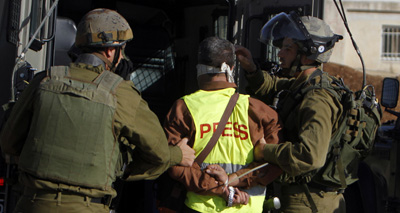Stark regional differences are seen as jailings grow significantly in the Middle East and North Africa. Dozens of journalists are held without charge, many in secret prisons. A CPJ special report
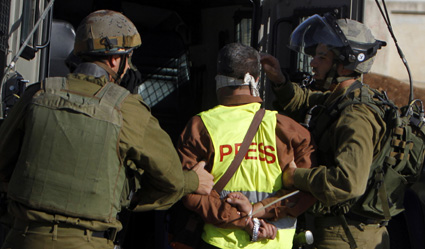
Published December 8, 2011
NEW YORK
The number of journalists imprisoned worldwide shot up more than 20 percent to its highest level since the mid-1990s, an increase driven largely by widespread jailings across the Middle East and North Africa, the Committee to Protect Journalists has found. In its annual census of imprisoned journalists, CPJ identified 179 writers, editors, and photojournalists behind bars on December 1, an increase of 34 over its 2010 tally.
MORE IN THIS REPORT
• Database of all
imprisoned journalists
• Video: “Freeing Eynulla Fatullayev”
• Blog: China’s crackdown
on ethnic journalists
• Blog: Ethiopia’s abuse
of terror laws
IN PRINT
• Download the pdf
IN OTHER LANGUAGES
• Français
• العربية
• فارسي
Iran was the world’s worst jailer, with 42 journalists behind bars, as authorities kept up a campaign of anti-press intimidation that began after the country’s disputed presidential election more than two years ago. Eritrea, China, Burma, Vietnam, Syria, and Turkey also ranked among the world’s worst. (Read detailed accounts of each imprisoned journalist.)
CPJ’s census found stark differences among regions. For the first time since CPJ began compiling annual prison surveys in 1990, not a single journalist in the Americas was in jail for work-related reasons on December 1. Imprisonments also continued a gradual decline in Europe and Central Asia, where only eight journalists were jailed, the lowest regional tally in six years. But those improvements were swamped by large-scale jailings across the Middle East and North Africa, where governments were holding 77 journalists behind bars, a figure that accounted for nearly 45 percent of the worldwide total. Asian and African nations also accounted for dozens of imprisonments.
While Iran’s 2009 post-election crackdown marked the beginning of widespread press imprisonments there, authorities have maintained a revolving cell door since that time, freeing some detainees on furloughs even as they make new arrests. Journalists freed on furloughs often post six-figure bonds and endure severe political pressure to keep silent or turn on their colleagues. “The volume of arrests, interrogations, and people out on bail is enormous,” said Omid Memarian, an exiled Iranian journalist. “The effect is that many journalists know they should not touch critical subjects. It really affects the way they cover the news because they are under constant fear and intimidation.” Among the 2011 detainees is Iranian editor Mohammad Davari, a CPJ International Press Freedom Award winner whose website exposed the abuse and rape of inmates at the now-closed Kahrizak Detention Center. More than half of the Iranian detainees are being held on antistate charges similar to those lodged against Davari.
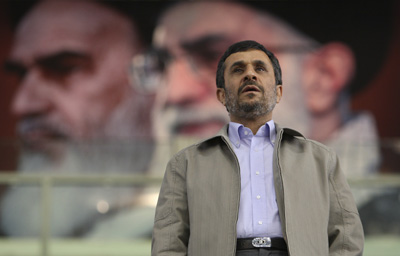
Antistate charges such as treason, subversion, or acting against national interests are the most common allegations brought against journalists worldwide. At least 79 journalists were being held on such charges, CPJ’s survey found.
But the 2011 census also found an alarming rise in the number of journalists held without charge or due process. Sixty-five journalists, accounting for more than a third of those in prison worldwide, were being held without any publicly disclosed charge, many of them in secret prisons without access to lawyers or family members. In some instances, governments such as those in Eritrea, Syria, and Gambia have denied the very existence of these jailed journalists. Reports of mistreatment and torture are common in these cases in which authorities operate without accountability and in contravention of international norms. Unconfirmed reports have identified at least six of these journalists as having died of mistreatment in custody. CPJ continues to list these detainees as it investigates the cases.
Imprisoning journalists without charge is practiced most commonly by the government of Eritrea, the world’s second worst jailer of the press with 28 behind bars. Although many have been jailed for a decade, not a single Eritrean detainee has ever been publicly charged with a crime. Those jailed include the Swedish-Eritrean editor Dawit Isaac, who has been held since the government shuttered the country’s independent press in 2001. Despite rising pressure from the European Parliament, Eritrean President Isaias Afewerki has made only vague assertions that Isaac made “a big mistake.”
In a number of countries, authorities have targeted journalists covering marginalized ethnic groups. Nowhere is this more evident than in China, where the government has ruthlessly cracked down on editors and writers who sought to give voice to the nation’s Tibetan and Uighur minority groups. Seventeen of the 27 journalists jailed in China covered oppressed ethnic groups. (Most of the others were online writers expressing dissident political views.) The detainees include Dokru Tsultrim, a monk whose news journal covered Tibetan affairs and who wrote critically about government policies toward Tibetans. Others may languish in China’s prison without coming to the notice of news organizations or advocacy groups. “We know so few of the names of people who have been detained or imprisoned for political crimes,” said John Kamm, chairman of the Dui Hua Foundation, a group that advocates for Chinese political prisoners.
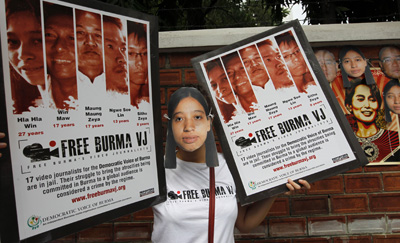
Despite being widely credited for their reform plans, Burma’s new civilian government leaders have done little to change the severely repressive practices of their military predecessors. Authorities were jailing at least 12 journalists by December 1, a figure consistent with tallies over the past decade and one that is exceedingly high given the country’s size. The world’s fourth worst jailer of the press, the Burmese government is holding people such as Hla Hla Win, an undercover reporter for the exile-run Democratic Voice of Burma. She was arrested in 2009 while trying to report a piece marking the second anniversary of the Saffron Revolution, a series of monk-led demonstrations that was violently put down by government troops. “After politicians, journalists are the second main target,” said Zin Linn, an exiled Burmese journalist and vice president of the Thailand-based Burma Media Association. That hasn’t changed with the new government, he added. “I’m not expecting them to be released very quickly.”
An ongoing crackdown against online reporting and commentary made Vietnam the world’s fifth worst jailer. All nine of the Vietnamese journalists behind bars on December 1 were bloggers who covered politically sensitive topics or the affairs of religious minorities. Among the detainees was Pham Minh Hoang, a blogger who wrote about official corruption, environmental degradation, and perceived government foreign policy failures.
Worldwide, 86 journalists whose work appeared primarily online were in jail on December 1, constituting nearly half of the census. The proportion is consistent with those seen in CPJ’s previous two surveys, which had followed several years of significant increases in the numbers of imprisoned online journalists. Print journalists constituted the second largest professional group, with 51 jailed worldwide. The other detainees were from radio, television, and documentary filmmaking.
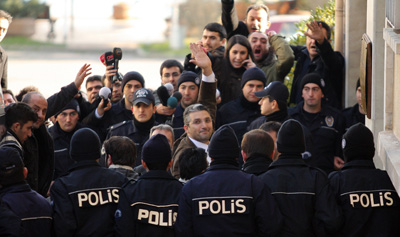
The number of journalists jailed in the Middle East and North Africa jumped by about 50 percent over last year. The increase came not only in nations such as Syria, where a repressive regime was jailing eight journalists in a desperate bid to retain power by suppressing independent reporting. Imprisonments were also reported in the stable democracy of Turkey, which was holding eight journalists when CPJ conducted its survey. While stepping up their past practice of imprisoning Kurdish editors and writers, authorities have also begun targeting mainstream journalists engaged in investigative reporting. The detainees in Turkey include Ahmet Şık and Nedim Şener, both prominent authors and newspaper journalists who critically probed government shortcomings. “After the imprisonment of these two journalists, it’s more threatening for all journalists,” said Erkan Saka, a political blogger and lecturer at Istanbul Bilgi University. “There is more self-censorship.”
Although the vast majority of detainees were local journalists being held by their own governments, eight international journalists were among those included on CPJ’s 2011 census. They include two Swedes, Johan Persson and Martin Schibbye, who were detained in Ethiopia while covering the activities of a separatist group. Seven journalists in all were being held in Ethiopia, five of them on vague and unsubstantiated terror charges. Despite international criticism, Ethiopia has aggressively expanded the use of its anti-terror law to criminalize news coverage of opposition groups. “It shows the government has no fear,” said Kassahun Yilma, an Ethiopian journalist who fled the country in 2009 when confronted with the prospect of imprisonment. Any critical Ethiopian reporter ends up facing the same dilemma, he said. “Should we stay at home and go to jail for nothing, or flee?”
CPJ confirmed the deaths of two journalists in Bahraini government custody. Karim Fakhrawi, a founder of the country’s leading independent newspaper Al-Wasat, and Zakariya Rashid Hassan al-Ashiri, editor of a local news website in his village of Al-Dair, died in Bahraini prisons within a week of each other in April. The government claimed the two died of natural causes, despite widespread allegations that abusive treatment led to their deaths.
Here are other trends and details that emerged in CPJ’s analysis:
-
The worldwide total is at its highest point since 1996, when CPJ recorded 185 journalists behind bars, a figure driven by Turkey’s suppression of ethnic Kurdish journalists. The increase over the 2010 tally was the biggest single-year jump in a decade.
-
At least 78 freelance journalists were in prison worldwide, constituting about 45 percent of the census, a proportion consistent with those seen in the previous two surveys. Freelance journalists can be vulnerable to imprisonment because they often do not have the legal and monetary support that news organizations can provide to staffers.
-
Antistate charges were the most common charge used to jail journalists. Violations of censorship rules, the second most common charge, were applied in 14 cases.
-
In 11 cases, governments used a variety of charges unrelated to journalism to retaliate against critical writers, editors, and photojournalists. Such charges range from drug possession to tax evasion. In the cases included in this census, CPJ has determined that the charges were most likely lodged in reprisal for the journalist’s work.
-
Charges of criminal defamation, reporting “false” news, and engaging in ethnic or religious “insult” constitute the other charges filed against journalists in the census.
-
For the first time in more than a decade, China did not lead or jointly lead the list of countries jailing journalists. That it was supplanted in 2011 was a reflection of the high numbers in Iran rather than a significant drop in China. The total of 27 journalists jailed in China on December 1 was consistent with figures documented over the past several years.
-
For the first time since 1996, no Cuban journalists appeared on CPJ’s census. The Cuban government was holding as many as 29 journalists in 2003, following a massive crackdown on dissent. The last of those detainees was freed in April 2011. Although no Cuban journalist was jailed on December 1, CPJ research shows that authorities continue to detain reporters and editors on a short-term basis as a form of harassment.
-
In the past year, CPJ advocacy led to the early release of at least 65 imprisoned journalists worldwide. Among those freed were two CPJ International Press Freedom Award winners: Cuban writer Héctor Maseda Gutiérrez and Azerbaijani editor Eynulla Fatullayev.
-
Two other CPJ awardees, Shi Tao in China and Davari in Iran, remained in jail on December 1. Shi was serving a 10-year prison term in China for divulging a propaganda department order that was retroactively declared a state secret.
CPJ believes that journalists should not be imprisoned for doing their jobs. The organization has sent letters expressing its serious concerns to each country that has imprisoned a journalist.
CPJ’s list is a snapshot of those incarcerated at midnight on December 1, 2011. It does not include the many journalists imprisoned and released throughout the year; accounts of those cases can be found at www.cpj.org. Journalists remain on CPJ’s list until the organization determines with reasonable certainty that they have been released or have died in custody.
Journalists who either disappear or are abducted by nonstate entities such as criminal gangs or militant groups are not included on the prison census. Their cases are classified as “missing” or “abducted.”
This report was compiled by CPJ staff with additional reporting by Kristin Jones.
